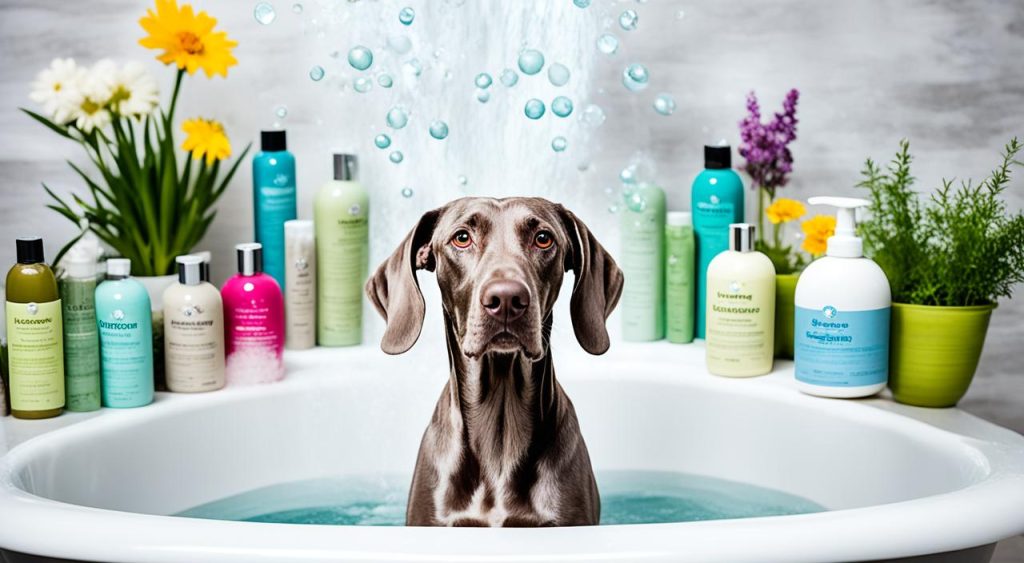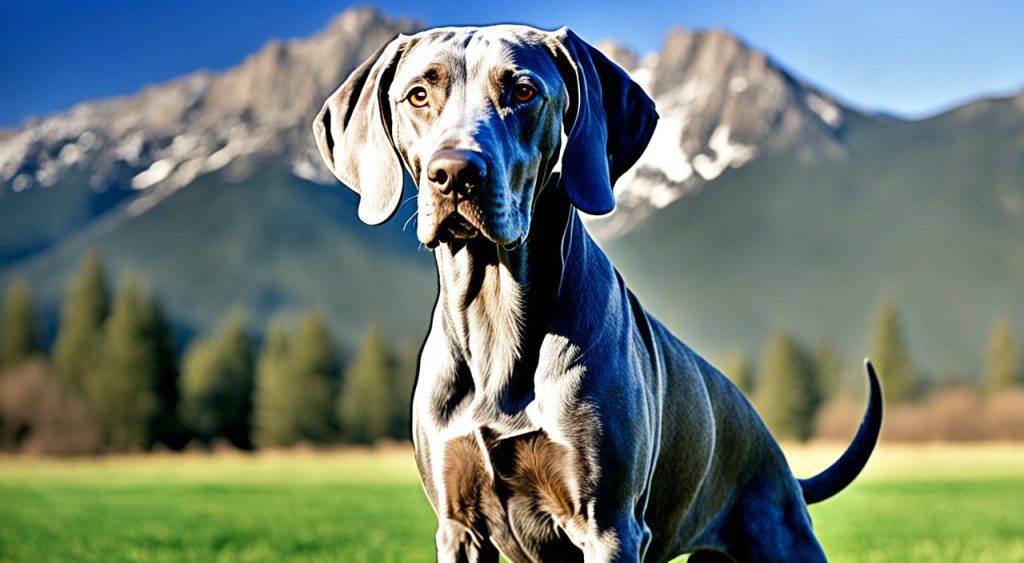If you own a Weimaraner, you may have noticed that they occasionally emit an unpleasant odor. Understanding the reasons behind this smell and finding effective solutions is essential for maintaining proper hygiene for your beloved pet.
There can be several factors contributing to the smell of your Weimaraner. Sweating, dental problems, gas, skin issues, infections, and anal sac problems are common culprits. By addressing these causes, you can eliminate the odor and ensure your Weimaraner stays clean and fresh-smelling.
Key Takeaways:
- Weimaraners can emit unpleasant odors due to sweating, dental problems, gas, skin issues, infections, and anal sac problems.
- Proper hygiene and regular veterinary care are essential for preventing and controlling Weimaraner smells.
- Addressing sweating, dental problems, gas, skin issues, infections, and anal sac problems through regular cleaning, grooming, and vet visits can help manage and eliminate the odor.
Common Causes of Smell in Weimaraners
Weimaraners can have a distinct smell for several reasons. Sweating, dental problems like plaque build-up, gas, skin issues, infections, and impacted anal sacs are common causes of odor in Weimaraners. Proper hygiene and regular veterinary care can help prevent and control these smells.
When it comes to Weimaraner odor, sweating is one of the contributing factors. Weimaraners are known for their high energy and love for physical activities. As they engage in exercise and play, they may sweat, which can lead to a noticeable odor. Taking the time to clean and wipe down your Weimaraner after their activities can help manage the scent caused by sweating. Additionally, regular bathing is essential to keep your Weimaraner clean and fresh-smelling.
Dental problems can also contribute to the smell in Weimaraners. Plaque build-up and tartar can result in bad breath, which can be unpleasant for both you and your furry friend. To eliminate Weimaraner odor caused by dental issues, it is important to prioritize their dental hygiene. Regular brushing of their teeth and scheduling annual dental cleanings are effective ways to prevent these problems and maintain fresh breath.
Gas and flatulence are common occurrences in dogs, including Weimaraners, and can lead to unwanted smells. Paying attention to your Weimaraner’s diet and avoiding foods that can cause excess gas can help reduce this odor. A healthy and balanced diet can contribute to better digestion and minimize gas production, ultimately resulting in a fresher-smelling Weimaraner.
Weimaraners can also suffer from various skin issues and allergies, which can lead to excessive oil secretion and an unpleasant odor. Regular bathing, using appropriate grooming techniques, and keeping their skin clean and moisturized can help manage these issues and prevent unpleasant smells. If the odor persists or worsens, it is advisable to consult a veterinarian for a proper diagnosis and treatment plan.
Infections, such as ear infections, can also cause odors in Weimaraners. Bacterial and yeast overgrowth can lead to additional skin issues and unpleasant smells. If you notice any signs of discomfort, changes in your Weimaraner’s skin or coat, or persistent smells, it is crucial to seek veterinary care for an accurate diagnosis and appropriate treatment.
Lastly, impacted anal sacs are a common cause of odor in Weimaraners. These sacs can release a foul-smelling secretion that lingers on the coat. Regular anal sac expression by a veterinarian can help prevent this odor and provide relief to your Weimaraner.
Taking proactive steps to prevent and control Weimaraner odor is essential for maintaining a pleasant environment for both you and your furry companion. Regular grooming, including bathing, teeth brushing, and anal sac expression, alongside a nutritious diet and regular veterinary check-ups, can go a long way in ensuring your Weimaraner stays fresh and odor-free.
Image: Weimaraner Odor Control
Sweating and Odor in Weimaraners
Weimaraners are known for their energetic nature and love for running and chasing. However, their active lifestyle can sometimes result in sweating, which in turn can contribute to a noticeable odor.
Regular cleaning and proper hygiene practices are essential for managing the scent caused by sweating in Weimaraners. One effective method is to wipe down your Weimaraner after exercise, focusing on areas where sweat tends to accumulate, such as the belly, chest, and paws. This helps remove any sweat residue and reduces the likelihood of an unpleasant odor.
Bathing your Weimaraner on a regular basis is also crucial for odor management. Use a gentle dog shampoo specifically formulated for their sensitive skin to avoid any irritation. Be sure to thoroughly rinse your Weimaraner to remove all traces of shampoo, as any leftover residue can potentially contribute to an unpleasant smell.
Additionally, it’s important to keep your Weimaraner’s living environment clean. Regularly clean their bedding, toys, and any other items they frequently come into contact with. This helps eliminate any lingering odors and maintains a fresh-smelling space for your beloved pet.
By implementing these proactive measures and incorporating proper grooming practices into your routine, you can effectively manage the scent caused by sweating in Weimaraners. Keeping your Weimaraner clean, fresh, and comfortable ensures a happy and odor-free companion.
Dental Problems and Bad Breath
Weimaraners, like any other dog breed, can develop dental issues that contribute to bad breath and unpleasant odors. One common problem is the build-up of plaque and tartar on their teeth. This can not only cause discomfort for your Weimaraner but also result in a noticeable odor.
To maintain optimal dental hygiene and eliminate Weimaraner odor, it is important to establish a regular dental care routine. Brushing your Weimaraner’s teeth with a dog-specific toothbrush and toothpaste is an effective way to remove plaque and prevent tartar accumulation. Aim to brush their teeth at least two to three times a week.
In addition to regular brushing, annual dental cleanings by a veterinarian are highly recommended. During these cleanings, your Weimaraner’s teeth will be thoroughly examined, and any dental issues can be addressed promptly. This not only helps eliminate odor but also prevents more serious dental problems in the long run.
By prioritizing your Weimaraner’s dental hygiene and incorporating these practices into their routine, you can effectively eliminate bad breath and ensure their overall oral health. Remember, a healthy mouth leads to a fresher-smelling Weimaraner!
Gas and Flatulence in Weimaraners
Like many dogs, Weimaraners can experience flatulence, resulting in unpleasant smells. Paying attention to your Weimaraner’s diet and avoiding foods that cause excessive gas can help reduce this odor. A healthy diet can contribute to better digestion and less gas production.
Managing Weimaraner Gas and Odor Control
Weimaraners are prone to flatulence, which can lead to unpleasant smells in your home. While it may be difficult to completely eliminate gas in dogs, certain dietary adjustments can help minimize the odor. Here are some tips to manage Weimaraner gas:
- Choose a high-quality dog food: Opt for a well-balanced and easily digestible dog food formulated for sensitive stomachs. Look for ingredients such as chicken, rice, and sweet potato, which are gentle on the digestive system and less likely to cause gas.
- Avoid known gas-inducing foods: Some foods are more likely to cause gas in dogs. These include beans, broccoli, cabbage, onions, and dairy products. Steer clear of these ingredients and observe if your Weimaraner’s gas improves.
- Feed smaller, frequent meals: Instead of one large meal, divide your Weimaraner’s daily food intake into smaller portions to prevent overeating and reduce the likelihood of gas accumulation.
- Slow down feeding: Rapid eating can cause dogs to swallow air, leading to increased flatulence. Consider using slow-feed bowls or puzzle toys to encourage slower eating and minimize air intake.
- Monitor treats and table scraps: Some treats and human foods can cause gas in dogs. Be cautious when giving your Weimaraner treats or table scraps and avoid those that are known to cause gas.
Remember, it’s essential to consult with your veterinarian before making any significant changes to your Weimaraner’s diet. They can provide personalized recommendations based on your dog’s specific needs and health conditions.
To ensure a pleasant living environment, implementing appropriate dietary measures can significantly reduce Weimaraner gas and its associated odor. By selecting the right food, avoiding gas-inducing ingredients, and feeding smaller, regular meals, you can help minimize gas production and enjoy a fresher-smelling home.
Next, let’s explore another potential cause of odor in Weimaraners: skin issues and allergies.
Skin Issues and Allergies
Weimaraners, like any other dog breed, can experience skin issues and allergies that may contribute to excessive oil secretion and unpleasant odors. It’s important to be proactive in managing these problems to ensure your Weimaraner’s comfort and well-being.
Regular bathing and proper grooming are essential in managing skin issues in Weimaraners. Bathing helps remove excess oil and debris from the skin, reducing the chances of bad odor development. When bathing your Weimaraner, use a mild shampoo specifically formulated for dogs to avoid irritating their sensitive skin.
Grooming should also include regular brushing to keep the coat clean and free from tangles or mats. Brushing helps distribute the skin’s natural oils, promoting a healthier coat and reducing the likelihood of odor-causing bacteria growth.
Proper bathing and grooming techniques can significantly contribute to managing Weimaraner skin problems and preventing unpleasant smells.
If you notice persistent or worsening skin issues or odor, it is important to consult a veterinarian. They can provide a thorough examination and recommend appropriate treatments and medications to address your Weimaraner’s specific skin concerns.
Remember, as a responsible pet owner, staying alert to changes in your Weimaraner’s skin condition and promptly addressing any issues will help keep your furry companion comfortable and odor-free.
Infections and Odor
Weimaraners are prone to various infections, including ear infections, which can contribute to unpleasant smells. When infections occur, bacteria and yeast can overgrow, leading to additional skin issues and odor. It is crucial to pay attention to any signs of discomfort or changes in your Weimaraner’s skin and coat, as these could indicate an infection.
If you notice any redness, swelling, discharge, or an unusual odor coming from your Weimaraner, it is recommended to seek veterinary care for a proper diagnosis and treatment plan. The veterinarian will be able to determine the source of the infection and provide the necessary medications or treatments to alleviate the odor and resolve the underlying issue.
Anal Sac Problems
Anal sac problems can be a common cause of odor in Weimaraners. These small glands, located on either side of your Weimaraner’s anus, produce a foul-smelling secretion that is typically released during bowel movements. However, when the anal sacs become impacted or infected, they can cause persistent odor and discomfort for your pet.
If you notice a strong, unpleasant smell coming from your Weimaraner, it’s important to consider the possibility of anal sac problems. The odor can be quite pungent and lingers on their coat, making it difficult to eliminate. It’s essential to address anal sac issues promptly to ensure your pet’s comfort and well-being.
To manage Weimaraner odor caused by anal sac problems, regular anal sac expression by a veterinarian is key. This procedure involves manually emptying the anal sacs, relieving any built-up secretions and preventing further odor. A veterinarian is best qualified to perform this procedure safely and effectively.
It’s important to note that attempting to express the anal sacs yourself can be risky and may cause injury or infection. Always seek professional veterinary care when dealing with anal sac problems to ensure the best outcomes for your Weimaraner.
Preventing Anal Sac Problems
While anal sac problems can occur despite your best efforts, there are a few preventive measures you can take to reduce the likelihood of issues:
– Providing your Weimaraner with a high-fiber diet can promote regular bowel movements, which can help prevent anal sac impaction.
– Regular exercise can also encourage healthy digestion and prevent constipation, reducing the risk of anal sac problems.
– Keep an eye on your Weimaraner’s anal area and notify your veterinarian if you notice any signs of inflammation, swelling, or discomfort.
– Lastly, regular veterinary check-ups can help identify and address any potential anal sac issues before they become problematic.
By being proactive in managing your Weimaraner’s anal sac health, you can minimize the chances of odor and discomfort caused by anal sac problems.
Tips for Preventing and Managing Weimaraner Odor
To prevent and manage Weimaraner odor, maintaining cleanliness is crucial. Regular grooming, including wiping down your Weimaraner after activities, brushing their teeth, and providing a healthy diet, can help eliminate bad smells. Consulting a veterinarian for proper care and treatment is essential for persistent or worsening odor issues.
Keeping your Weimaraner clean and well-groomed is key to preventing unpleasant odors. Regularly bathe your dog using a mild dog shampoo that is suitable for their sensitive skin. Pay extra attention to areas prone to odors, such as the ears and paws. After bathing, thoroughly dry your Weimaraner to prevent moisture buildup, which can contribute to odor.
Brushing your Weimaraner’s teeth regularly is another important step in odor prevention. Dental problems can cause bad breath, leading to overall unpleasant odors. Use a dog-specific toothbrush and toothpaste to clean your Weimaraner’s teeth and freshen their breath. Veterinary dental cleanings may also be recommended to maintain oral hygiene.
Providing a healthy diet is crucial for preventing Weimaraner odor. Choose high-quality dog food that is rich in nutrients and free from artificial additives. A balanced diet can contribute to better digestion and overall health, reducing the potential for odorous gas and stool. Avoid feeding your Weimaraner food that can cause excessive gas, such as beans, dairy products, and certain vegetables.
Regular veterinary care is essential in managing any persistent or worsening odor issues. Your veterinarian can examine your Weimaraner for any underlying health conditions that may contribute to odor. They can also provide specific guidance on grooming techniques, dietary recommendations, and potential treatments for odor control.
By following these grooming tips, maintaining a healthy diet, and seeking professional advice when needed, you can effectively prevent and manage Weimaraner odor, ensuring a pleasant environment for both you and your beloved Weimaraner.
Conclusion
Weimaraners are known to occasionally emit unpleasant odors, but understanding the causes and implementing proper hygiene practices can help eliminate and prevent these smells. Regular veterinary care, including dental cleanings, skin checks, and anal sac expression, is essential for maintaining a fresh-smelling Weimaraner.
One of the key strategies for eliminating Weimaraner odor is proper grooming. Regularly bathing your Weimaraner with dog-friendly shampoo and conditioner can help remove dirt and oil buildup that contributes to the smell. Additionally, brushing your Weimaraner’s teeth regularly and providing a balanced and nutritious diet can help prevent dental problems and eliminate bad breath.
Furthermore, paying attention to your Weimaraner’s ears and anal sacs is crucial. Cleaning their ears regularly can prevent infections that cause foul odors, while regular expression of the anal sacs by a veterinarian can prevent uncomfortable impactions and the associated smell.
By following these recommended practices, you can ensure that your Weimaraner remains fresh-smelling and happy. Remember, if the odor persists or worsens despite your efforts, consulting a veterinarian is always advisable for proper diagnosis and treatment.




